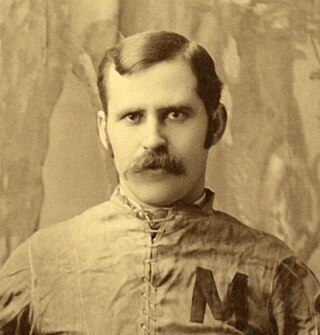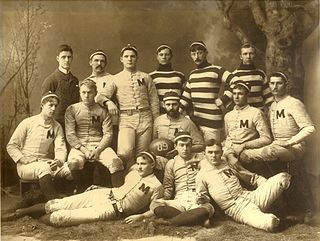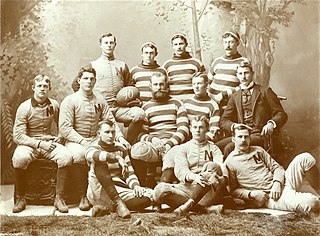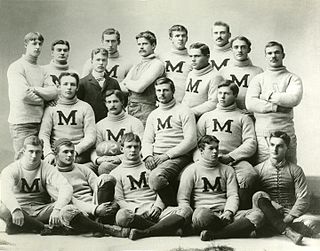
Francis Bemis Crawford Jr. was an American college football player and coach, lawyer, and law professor. He served as the first full-time head football coach at both Michigan and Nebraska, and also coached at Baker and Texas for single seasons. Crawford attended Yale University and served as a lawyer in Nebraska and France following his retirement from football. He was a professor of law at Creighton College of Law from 1906 to 1913.

The 1901 Michigan Wolverines football team was an American football team that represented the University of Michigan in the Western Conference during the 1901 Western Conference football season. In their first year under head coach Fielding H. Yost, the team compiled a perfect 11–0 record, outscored its opponents by a combined total of 550 to 0, tied with Wisconsin for the Western Conference championship, and defeated Stanford by a 49 to 0 score in the inaugural Rose Bowl game, the first college bowl game ever played. Northwestern (8–2–1) had the best record of a Michigan opponent, however Michigan still managed to win 29–0. The 1901 team was the first of Yost's famed "Point-a-Minute" teams, so named for their high scoring offense. From 1901 to 1905, Yost's Michigan teams compiled a record of 55–1–1 and outscored their opponents by a combined score of 2,821 to 42.

The 1886 Michigan Wolverines football team represented the University of Michigan in the 1886 college football season. The team played only two games, both against Albion College. Michigan won both games by a combined score of 74 to 0. Charles D. Wright, a senior from Minneapolis, Minnesota, scored six touchdowns in the first game. The manager and goalkeeper was John L. Duffy, a senior from Ann Arbor.

Horace Greely Prettyman was an American football player in the early years of the sport. Prettyman won a record eight varsity letters at the University of Michigan, playing for the school's football team from 1882 to 1886 and 1888 to 1890. He was the team's captain in 1884, 1885, and 1886, and scored the first touchdown in the first game played at Michigan's first home football field in Ann Arbor. Prettyman later became a successful businessman and civic leader, operating a boarding house, a laundry service, a power company and the Ann Arbor Press, and holding office as an Ann Arbor city councilman, postmaster and Washtenaw County, Michigan supervisor.

The 1881 Michigan Wolverines football team represented the University of Michigan in the 1881 college football season. While the University of Michigan had fielded "football" teams in 1879 and 1880, those teams played a game that was more in line with traditional rugby, and many consider the 1881 team to be the first at Michigan to play American football. The team finished with a record of 0–3 after playing the top teams in the country – Harvard, Yale and Princeton.

The 1894 Michigan Wolverines football team was an American football team that represented the University of Michigan in the 1894 college football season. In its first season under head coach William McCauley, the team compiled a 9–1–1 record and outscored its opponents by a combined score of 244 to 84.

The 1893 Michigan Wolverines football team was an American football that represented the University of Michigan as a member of the Intercollegiate Athletic Association of the Northwest during the 1893 college football season. In its second season under head coach Frank Barbour, the team compiled a 7–3 record and outscored its opponents by a combined score of 278 to 102.

The 1890 Michigan Wolverines football team was an American football team that represented the University of Michigan in the 1890 college football season. The team compiled a 4–1 record and outscored its opponents by a combined score of 129 to 36. The team's sole loss was to Cornell in the final game of the season.

The 1885 Michigan Wolverines football team represented the University of Michigan in the 1885 college football season. The team compiled a 3–0 record and outscored its opponents by a combined score of 82 to 2. The team captain was Horace Greely Prettyman.

The 1884 Michigan Wolverines football team represented the University of Michigan in the 1884 college football season. The team compiled a 2–0 record and outscored its opponents by a combined score of 36 to 10. The team captain was Horace Greely Prettyman. Prettyman played a record eight years on the Michigan Wolverines football team between 1882 and 1890. The team's manager and starting center was Henry Killilea. Killilea was one of the five men who founded baseball's American League as a major league in 1899. He also owned the Boston Red Sox from 1903 until 1904. Quarterback Thomas H. McNeil went on to become the 30th Grand Chancellor of the Knights of Pythias.

The 1888 Michigan Wolverines football team represented the University of Michigan in the 1888 college football season. The team compiled a 2–1 record and outscored its opponents by a combined score of 94 to 36. The team scored 76 points against Albion College, a single-game Michigan record that stood until Fielding H. Yost's 1901 "Point-a-Minute" team scored 128 points against Buffalo. The team closed its season with a Thanksgiving Day game against a "picked team" from the Chicago University Club that The New York Times called "undoubtedly the greatest football event that ever took place in the West." The captain of the 1888 team was halfback James E. Duffy who had set the world's record for dropkick distance in 1886.

The 1882 Michigan Wolverines football team represented the University of Michigan in the 1882 college football season. The team played no outside games. The captain of the 1882 team was William J. Olcott.

The 1892 Michigan Wolverines football team was an American football team that represented the University of Michigan in the 1892 college football season. In its first season under head coach Frank Barbour, the team compiled a 7–5 record and outscored its opponents by a combined score of 298 to 170. With 298 points scored, the team held the record for the most points scored in a single season by a Michigan football team until 1901.

The 1889 Michigan Wolverines football team represented the University of Michigan in the 1889 college football season. The Wolverines played their home games at Ann Arbor Fairgrounds.

The 1891 Michigan Wolverines football team was an American football team that represented the University of Michigan in the 1891 college football season. The team compiled a 4–5 record and outscored opponents by a total of 168 to 124.

Charles William Grube was an American football player.

James Eugene Duffy was an American football player and lawyer. He played halfback for the University of Michigan football team for seven years from 1885 to 1891 and was captain of the 1888 team. In 1886, he set the world record by drop kicking a football 168 feet, 7½ inches. After graduating from Michigan, he was an attorney in Bay City, Michigan and a long-time member of the University of Michigan Board in Control of Athletics.

William James Olcott was an American college football player and mining and railroad executive in the Mesabi Range. He played football for the University of Michigan from 1881 to 1883 and was captain of the 1882 and 1883 teams. After receiving his degree, he worked in the iron ore mining industry for more than 40 years. He was president of the Oliver Iron Mining Company from 1909 to 1928 and president of the Duluth, Missabe and Iron Range Railway from 1901 to 1909.

Royal Twombly Farrand was an American football player and medical doctor. He was the quarterback of the undefeated 1887 Michigan Wolverines football team and led Michigan to a victory in the first meeting in the Michigan–Notre Dame football rivalry.

The History of Michigan Wolverines football in the early years covers the history of the University of Michigan Wolverines football program from its formation in the 1870s through the hiring of Fielding H. Yost prior to the 1901 season. Michigan was independent of any conference until 1896 when it became one of the founding members of the Western Conference. The team played its home games at the Washtenaw County Fairgrounds from 1883 to 1892 and then at Regents Field starting in 1893.


















